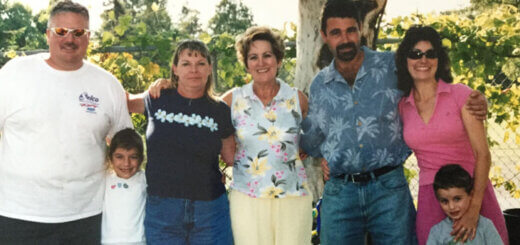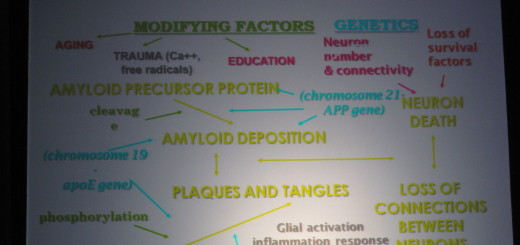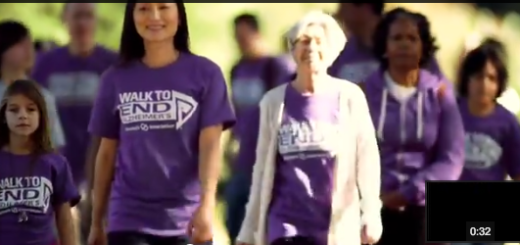Nine-time grand champion honors father every day
When JoAnn Jones’ father Butch was diagnosed with dementia, she knew she had to help care for him. Because of the support and flexibility of her employer, JoAnn was able to spend more time caring for her father. Through her company’s donation matching program, JoAnn was also able to increase her fundraising efforts to help fund care, support and research in her community.
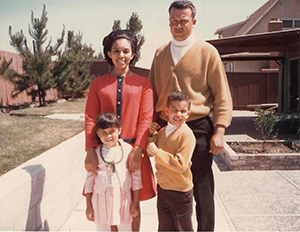
Growing up together
JoAnn’s parents got married when Butch was 17 and her mom, Stephanie, was 16. By the time Butch was 20, they had two children. “We grew up with them,” shared JoAnn. “It was wonderful. We were a close-knit family. There were just the four of us, and we did everything together.”
Butch Jones was a humble man who liked fishing, hunting and riding horses. After spending 15 years as a cement mason, he opened his own company installing waterproof flooring. Butch was also an amazing cook. “Mom would come home from work and dinner would be on the table,” said JoAnn. “Mom was a phenomenal cook, but Dad did it all. Dad could go into any restaurant, try something, come home and replicate it even better.”
Butch was the kind of dad that knew the trouble his kids were about to get into before they did it. He’d let them know if they were on the wrong path, but also let them make their own choices. JoAnn said, “He never said, “˜I told you so,’ and instead would ask us, “˜what did we learn?'”
Tired on the road
As someone who ran a construction company, Butch was constantly driving all over the state. JoAnn said, “He could be in San Jose in the morning, Sacramento in the afternoon and back to San Jose in the evening. He was a road warrior.”
Butch’s family found it odd when he started drinking a lot of energy drinks to help him stay awake on his drives. He had always had bottles of water in his truck, so when he switched to energy drinks, it didn’t raise any immediate red flags for the family.
One day, on the way to a cutting horse competition in Red Bluff, Butch was in a car accident. “We think he fell asleep at the wheel,” said JoAnn. “He flipped his trailer and got a concussion. After that we noticed big changes.”
Giving up driving
Driving requires the ability to react quickly to a variety of circumstances. Because of this, a person living with Alzheimer’s will, at some point, be unable to drive safely. Some people give up driving easily, but for others this transition can be very difficult. The person may become angry, either because they feel as though they are losing their independence or because of the memory and insight issues that are part of Alzheimer’s.
After the car accident, JoAnn and her family noticed that when Butch would drive, he’d get confused. “Dad never let anyone else drive,” said JoAnn. “You’d be in the car with him, and you’d see his eyes glaze over like he was confused and not sure where he was going. He didn’t want to give up driving.”
Stephanie started noticing that in addition to his issues with driving, he was also unable to do math in his head, a skill he had excelled at. This was the final sign that raised an alarm for Stephanie. In 2007, she took Butch to see a neurologist, who diagnosed him with mild cognitive impairment (MCI).
JoAnn and Stephanie spent a lot of time trying to come up with different ways they could let Butch know it was time to stop driving. “One of the things my mom and I feared the most is the day we’d have to tell my dad he could no longer drive,” said JoAnn. “My dad is a very proud man, and we knew this would be the most challenging conversations we’d have to deal with. We knew there was nothing we could do that would soften the blow.”
Surprisingly, about two years after his diagnosis, Butch came to the decision on his own that it was time to stop driving. “We didn’t have to take his keys away,” said JoAnn. “Instead of saying “˜I can no longer drive,’ he told my mom, “˜There are bad things happening in the world and I think the two of us should commute into the shop together now.'”
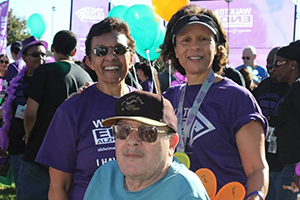
Shared caregiving
As time went on, Butch was no longer able to climb into and out of a car. Stephanie and their son continued to oversee the company, but Butch could not be home alone.
With much convincing from her children, Stephanie reluctantly agreed to hire a part time caregiver. However, Butch didn’t want a caregiver either, so with some quick-thinking JoAnn and her family came up with a new idea.
“We told my dad the person was a nurse and that they were there because the doctor gave him a new medication that could make him dizzy,” said JoAnn. “The doctors had told us that since my dad was such a big man, we would need to concede at some point and move him in a long-term care setting.
“That hit us like a ton of bricks, to say the least. We vowed we would do everything we could to make sure he could remain with us.”
Between JoAnn, Stephanie, and the two part-time caregivers, they were able to cover the entire day of caring for Butch. The part-time caregivers would help him get ready for the day in the mornings, and stay until early afternoon, when Stephanie would return home. JoAnn and her mother would take care of Butch until the evening, when the caregivers would return to get Butch ready for bed.
“My mom was the real hero in the caregiving,” said JoAnn. “My mom is a very strong woman, I just had to follow her lead and be her support person. In my heart I believe because of her impeccable care plan, my dad was able to be with us until the end. He fell asleep every night holding her hand.”
Support from her manager
JoAnn is a Senior Project Manager for The Clorox Company, which manufactures consumer and professional cleaning products. At the time, JoAnn had been with The Clorox Company for about ten years. She had a proven track record of success and her manager knew her well.
“My manager had noticed changes,” said JoAnn. “I’d come in dragging, with dark circles under my eyes. I took it upon myself to be open and honest with him. My manager was very supportive and told me that as long as I got my work done, he didn’t care when I got it done.”
The Clorox Company is committed to “making lives better every day,” which was especially true for JoAnn as her father’s disease progressed. “My company was supportive,” said JoAnn. “I told them what was going on and my manager told me, “˜You do whatever you need to do to support your family.'”
This gave JoAnn the permission to work from home more often. She was able to drop in to visit her father whenever she wanted or needed to. “I was able to tailor my schedule and maintain my workload,” said JoAnn.
“I thought it was important for me to balance both and I needed an outlet. Clorox allowed me the space and flexibility to maintain both.”
Additionally, The Clorox Company provides their employees with time off for caregiving and personal needs, which JoAnn used. “If I was mentally exhausted or needed to help more with my dad, I was able to take a day off here or there,” said JoAnn. “I could not have worked for a better manager or a better company.”
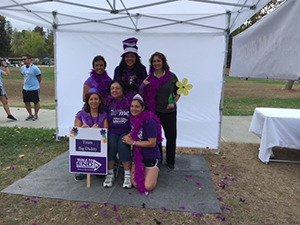
Participating in Walk to End Alzheimer’s
A few years later, in 2010, JoAnn’s best friend heard about this small event that was happening in Walnut Creek and asked if JoAnn wanted to participate. It was called Walk to End Alzheimer’s®.
JoAnn eagerly agreed to do the Walk. She felt it was a great way to get involved and raise awareness. “My dad’s father also had Alzheimer’s,” said JoAnn. “But that was years ago, before they had a name for it.”
When JoAnn arrived at the event, she was pleasantly surprised to see brochures and information on different local agencies that could help her family. She was also connected to the Alzheimer’s Association’s website, which she hadn’t previously known about, and proved to be a valuable resource for her.
“Prior to participating in my very first Walk, my dad was still essentially himself,” said JoAnn. “At that point we really weren’t looking for help or resources, we were in a learning curve.” That year, JoAnn was one of the top fundraisers, raising over $5,000.
Caregiver advice
JoAnn helped care for her father for eight years, and during that time she learned a few important things about being a good caregiver:
- Take care of yourself
- Ask for help
- Find the right caregiver for your family
- Help others understand what you’re going through
- Keep a normal routine for your loved one
- Keep your loved one active and involved
- Find a support system
“I realized if you want to be a good caregiver, you have to have the energy you need and the mental clarity to do that,” said JoAnn. “Don’t keep things locked up, it’s not healthy. It’s so important to find your support system and make it work for you.
“Alzheimer’s is a horrible disease, but it doesn’t need to define your family. The positive outcome that came out of my experience with Alzheimer’s is that I truly understand what unconditional love means and am so thankful for the family I have.”
Company fundraising support
The Clorox Company offers to match donations that their employees make to nonprofits through a gift campaign. “Clorox is a charitable organization,” said JoAnn.
“I see this as an employee benefit. If you’re passionate about a cause, Clorox wants to support your passion.
“We can do biweekly payroll deposits into a gift account and Clorox will match up to $2,500. This year, because of the pandemic, they raised the match to $5,000.”
For JoAnn’s first year participating in Walk, she decided to use the gift account towards her Walk team. In addition to this, she sent out emails to people she worked closely with at the company and shared her story. JoAnn said, “I told them my father was dealing with Alzheimer’s and that I was raising funds to help caregivers and hopefully find a cure.”
JoAnn also found she could send emails to friends and family through the Walk to End Alzheimer’s website. “I don’t like to hound people to make a donation,” said JoAnn. “All I did was send out one email when I first signed up. Two months later, I sent another email and a third one right before the Walk.”
Since then, JoAnn has continued to use her gift account towards her Walk to End Alzheimer’s fundraising goals. 2020 marked JoAnn’s ninth time as a Grand Champion (Walkers who raise $1,000 or more). So far JoAnn has raised over $45,000 for Alzheimer’s care, support and research.
Continuing to Walk
Despite her father’s death in 2016, JoAnn continues to Walk and support the Alzheimer’s Association. Whenever she participates in Walk, it reminds her of her second year where she had to push her father, who was then in a wheelchair, up a very steep hill.
“I got this momentum going to get him up that hill, but halfway up I started to run out of gas,” said JoAnn. “At the Walk there are people around you, but I still felt alone, when a guy behind me says, “˜Coming in behind you.’
“He grabbed my dad’s wheelchair and pushed him to the top of the hill. That was when I felt like I had a community.
“My dad is with me every day. He may not be with me physically, but he is in my heart. I would do anything for him, and this is what I can give him. I can show him that I’m still fighting for him. I also Walk for everyone else. It empowers them to know they’re not alone.”
The 2020 season of Walk to End Alzheimer’s may be over but it’s not too late to donate. The funds raised will help advance the mission of the Alzheimer’s Association by enabling critical care and support services and advancing research toward methods of prevention, treatment and, ultimately, a cure. Support Walk to End Alzheimer’s and make a donation today.
Learn more:





